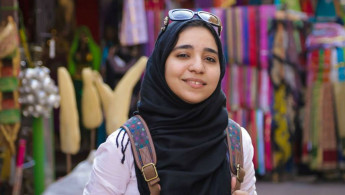Egypt: Amnesty sounds alarm over health of Israa al-Taweel
Detained Egyptian Student Israa Al-Taweel may not be able to walk again unless she can continue her physiotherapy treatment, rights group Amnesty International has warned.
3 min read
Taweel was shot in the back at a protest in 2014 [Twitter]
A 23-year-old Egyptian student who was arrested in a recent wave of “enforced disappearances” could possibly lose the ability to walk if prison authorities do not provide her with adequate medical care, a human rights organisation has said.
Amnesty International released a statement on Friday saying that if detained photojournalist Israa al-Taweel continues to be denied physiotherapy for a spinal injury she sustained in 2014, she could become permanently disabled.
Taweel went missing in June while out to eat at a restaurant with her friends in the quiet Cairo suburban neighbourhood of Maadi, she and two of her friends were arrested by plainclothes police and thrown into the back of white minivan then blindfolded.
Sixteen days later she turned up in a Cairo prison facing charges of belonging to the now-banned Muslim Brotherhood and “spreading false news”.
Taweel was shot in the back at a protest, she was initially confined to a wheelchair but had been making progress with physiotherapy, enabling her to walk with the aid of crutches until the sudden arrest.
Her friend Suhaib Saad who was also arrested in the raid was forced to appear on television five weeks later, looking dishevelled and weak, and confess he had a role in what the military called a dangerous terrorist cell.
Taweel and her friends are part of a disturbing trend of Egyptian political dissidents and journalists that have going missing in highly suspect circumstances, following the 2013 military coup.
Last week, the Egyptian Coordination for Rights and Freedoms [ECRF] released a report that 1,250 forced disappearances have taken place since the beginning of this year.
The head of the ECRF told Daily News Egypt that the majority of disappearances are Islamists, while there is a small number of liberal activists and those who are anti-government but are not affiliated to any particular group.
Taweel is not alone in being denied medical care while in detention.
Several jailed Islamists have died because of “deliberate” medical neglect, since the country’s President Abd al-Fattah al-Sisi launched a harsh crackdown on Islamists after he ousted the country’s first freely elected president Mohammad Morsi.
In July, the family of member of the Muslim Brotherhood Essam Hamed claimed the 50-year-old had died in Egypt's Wadi al-Natrun prison after receiving "deliberate medical negligence" from prison authorities.
“Prison authorities routinely refuse life-saving care to detainees and appear to be under little or no pressure or oversight from higher officials in the Interior Ministry or Sisi's administration," Human Rights Watch told Reuters in a recent report that outlined a pattern of neglect towards political detainees in Egyptian prisons.
Amnesty has called for a letter-writing campaign directed at the Minister of Interior and the Public Prosecutor’s office to call for the provision of treatment for Taweel.
Amnesty International released a statement on Friday saying that if detained photojournalist Israa al-Taweel continues to be denied physiotherapy for a spinal injury she sustained in 2014, she could become permanently disabled.
Taweel went missing in June while out to eat at a restaurant with her friends in the quiet Cairo suburban neighbourhood of Maadi, she and two of her friends were arrested by plainclothes police and thrown into the back of white minivan then blindfolded.
Sixteen days later she turned up in a Cairo prison facing charges of belonging to the now-banned Muslim Brotherhood and “spreading false news”.
Taweel was shot in the back at a protest, she was initially confined to a wheelchair but had been making progress with physiotherapy, enabling her to walk with the aid of crutches until the sudden arrest.
Her friend Suhaib Saad who was also arrested in the raid was forced to appear on television five weeks later, looking dishevelled and weak, and confess he had a role in what the military called a dangerous terrorist cell.
Taweel and her friends are part of a disturbing trend of Egyptian political dissidents and journalists that have going missing in highly suspect circumstances, following the 2013 military coup.
Last week, the Egyptian Coordination for Rights and Freedoms [ECRF] released a report that 1,250 forced disappearances have taken place since the beginning of this year.
The head of the ECRF told Daily News Egypt that the majority of disappearances are Islamists, while there is a small number of liberal activists and those who are anti-government but are not affiliated to any particular group.
Taweel is not alone in being denied medical care while in detention.
Several jailed Islamists have died because of “deliberate” medical neglect, since the country’s President Abd al-Fattah al-Sisi launched a harsh crackdown on Islamists after he ousted the country’s first freely elected president Mohammad Morsi.
In July, the family of member of the Muslim Brotherhood Essam Hamed claimed the 50-year-old had died in Egypt's Wadi al-Natrun prison after receiving "deliberate medical negligence" from prison authorities.
“Prison authorities routinely refuse life-saving care to detainees and appear to be under little or no pressure or oversight from higher officials in the Interior Ministry or Sisi's administration," Human Rights Watch told Reuters in a recent report that outlined a pattern of neglect towards political detainees in Egyptian prisons.
Amnesty has called for a letter-writing campaign directed at the Minister of Interior and the Public Prosecutor’s office to call for the provision of treatment for Taweel.





 Follow the Middle East's top stories in English at The New Arab on Google News
Follow the Middle East's top stories in English at The New Arab on Google News
![Israeli forces ordered bombed Gaza's Jabalia, ordering residents to leave [Getty]](/sites/default/files/styles/image_330x185/public/2176418030.jpeg?h=a5f2f23a&itok=_YGZaP1z)

